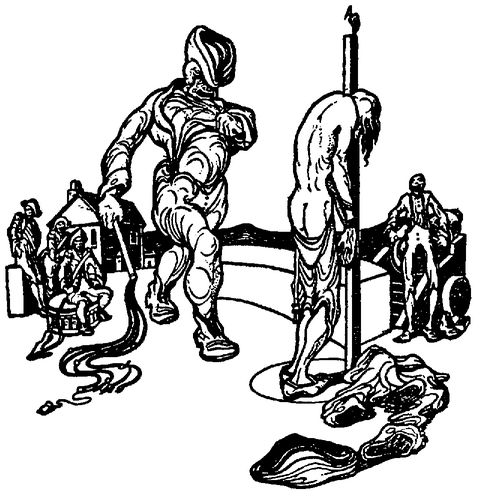Candide, driven out of this earthly paradise, wandered a long time without knowing where he went; sometimes he raised his eyes, all wet with tears, towards heaven, and sometimes he cast a melancholy look towards the magnificent castle, where the fairest of young baronesses lived. He laid himself down to sleep in a furrow, heart-broken, and supperless. The snow fell in great flakes and in the morning, when he awoke, he was almost frozen to death; however, he dragged himself to the next town, which was called Walds-berghoff-trarbk-dikdorff, without a penny in his pocket, and half dead with hunger and fatigue. He took up his stand at the door of an inn. He had not been long there, before two men dressed in blue
c fixed their eyes steadfastly upon him. “Faith, comrade,” said one of them to the other, “there is a well-made young fellow, and of the right size”; upon which they approached Candide, and with the greatest civility and politeness invited him to dine with them. “Gentlemen,” replied Candide, with a most engaging modesty, “you do me much honour; but I really don’t have enough money to pay my share.” “Money, sir,” said one of the blues to him, “young persons of your appearance and merit never pay anything; why, are not you five feet five inches tall?” “Yes, gentlemen, that is really my size,” replied he, with a low bow. “Come then, sir, sit down with us; we will not only pay your bill, but we will never allow such a clever young fellow as you to be short on money. Mankind were born to assist one another.” “You are perfectly right, gentlemen,” said Candide, “this is precisely the doctrine of Master Pangloss ; and I am convinced that everything is for the best.” His generous companions next begged him to accept a few crowns, which he readily complied with, at the same time offering them an I.O.U. for the payment, which they refused, and then sat down at the table together. “Have you not a great affection for———?” “O yes; I have a great affection for the lovely Miss Cunégonde.” “Maybe so,” replied one of the blues; “but that is not the question. We are asking you whether you have not a great affection for the King of the Bulgarians?” “For the King of the Bulgarians?” said Candide. “Oh, Lord! not at all; why, I never saw him in my life.” “Is it possible! Oh, he is a most charming king. Come, we must drink his health.” “With all my heart, gentlemen,” says Candide, and he drinks his glass. “That will do!” cry the blues; “you are now the support, the defender, the hero of the Bulgarians; your fortune is made; your future is assured.” So saying, they handcuff him, and carry him away to the regiment. There he is made to wheel about to the right, to the left, to draw his rammer, to return his rammer, to present, to fire, to march; and they give him thirty blows with a cane. The next day he performs his exercise a little better, and they give him but twenty. The day after he comes off with ten, and is looked upon as a young fellow of surprising genius by all his comrades.
Candide was struck with amazement and really could not conceive how he came to be a hero. One fine spring morning he took it into his head to take a walk, and he marched straight forward, conceiving it to be a privilege of the human species, as well as of animals in general, to make use of their legs how and when they pleased. He had not gone above two leagues when he was overtaken by four other heroes, six feet high, who bound him neck and heels and carried him to a dungeon. At the court-martial, he was asked which he preferred: to be flogged thirty-six times by the whole regiment, or to have his brains blown out with a dozen musket balls. In vain did he remonstrate with them, that the human will is free, and that he chose neither. They pressed him to make a choice, and he determined, in virtue of that divine gift called free-will, to be flogged thirty-six times. He had gone through two floggings, and the regiment being composed of 2,000 men, that made for him exactly 4,000 strokes, which lay bare all his muscles and nerves from the nape of his neck to his rump. As they were preparing to make him set out the third time our young hero, unable to support it any longer, begged as a favour they would be so obliging as to shoot him through the head. The favour being granted, a bandage was tied over his eyes, and he was made to kneel down. At that very instant the King of the Bulgars, happening to pass by, made a stop and enquired into the delinquent’s crime, and being a prince of great genius, he found, from what he heard of Candide, that he was a young metaphysician, entirely ignorant of the world; and therefore, out of his great clemency, he condescended to pardon him, for which his name will be celebrated in every journal and in every age. A skilful surgeon cured the flagellated Candide in three weeks, by means of emollient unguents prescribed by Dioscorides.
d His sores were now skinned over, and he was able to march, when the King of the Bulgarians gave battle to the King of the Abares.
3
